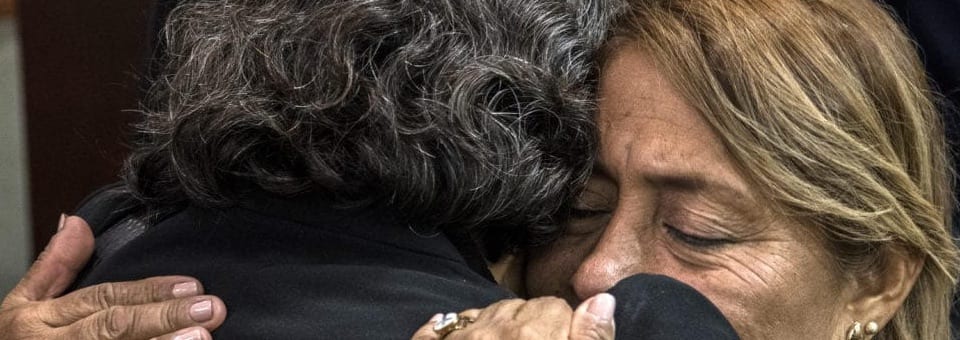Landmark Ruling Will Help Protect Schoolgirls from Sexual Violence Throughout Latin America

The Center and partners win a major case before the Inter-American Court of Human Rights that sets standards in countries throughout the region.
In a landmark ruling with wide-reaching impact, the Inter-American Court of Human Rights has established standards to protect girls from sexual violence and harassment in schools throughout Latin America and the Caribbean. The ruling also holds Ecuador responsible for failing to protect an adolescent public-school student from the sexual violence she suffered in the public school she attended.
The case, Paola Guzmán Albarracín v. Ecuador, was brought by the Center for Reproductive Rights and its partner, the Ecuadorian Center for the Promotion and Action of Women (CEPAM-Guayaquil).
The ruling, which came on August 14, 2020, requires States in the Latin America and Caribbean (LAC) region to guarantee girls and adolescents access to sexual and reproductive education, acknowledge their autonomy, and recognize the importance of consent as the foundation of sexual and reproductive rights.
The Court’s decision comes 18 years after the tragic death of Paola Guzmán Albarracín, a 16-year-old Ecuadorian girl who took her own life after repeated sexual abuse by her school’s vice-principal.
“Today’s victory not only provides a measure of justice to Paola’s family, but will also help protect thousands of girls all over Latin America and beyond who face sexual violence at school and have no access to sexual and reproductive health rights and services,” said Nancy Northup, president and CEO of the Center for Reproductive Rights. “This ruling is an important step in our work to ensure that women and girls’ fundamental human rights are recognized and respected around the world.”
Ruling Has Wide-Reaching Impact
The Inter-American Court of Human Rights is the highest judicial body for human rights in the Americas. Paola Guzmán Albarracín v. Ecuador is the Court’s first case on sexual violence in school settings and the ruling will safeguard young people’s sexual and reproductive health throughout the entire region of Latin America and the Caribbean. Moreover, its rulings, based on the American Convention on Human Rights, have been understood as binding to all of the States under its jurisdiction, and have been traditionally used as a binding interpretation by the Inter-American Commission of Human Rights when ruling on cases and elaborating reports on the whole Americas region, under the OAS Charter.
The Center and CEPAM-Guayaquil first filed a petition with the Inter-American Commission on Human Rights on Paola’s behalf in 2006. In 2015, the Commission held the Ecuadorian State responsible for violating Paola’s rights to life, personal integrity, autonomy, private life and dignity, her right to enjoy special protection from the State as a child, her right to equality and non-discrimination, her rights to education and health, and her right to live free from gender violence. The Commission then advanced Paola’s case to the Inter-American Court of Human Rights, where the Center presented oral arguments on January 28, 2020.
In the decision, the Inter-American Court of Human Rights substantially echoed the Commission’s conclusions, and found Ecuador liable for a breach of her rights to life, personal integrity, private life and dignity, her right to enjoy special protection from the State as a child, her right to equality and non-discrimination, her right to education, and her right to live free from gender violence.
“The Court understood that Paola’s case is representative of thousands of other children and adolescents who were victims not only of their abusers but of the lack of sexual and reproductive education,” said Catalina Martínez Coral, director for Latin America and the Caribbean at the Center. “This unprecedented victory demonstrates the Center’s commitment to advancing the equality, autonomy and dignity of women and girls around the world.”
“My daughter’s name has been finally cleared after being assumed guilty by the Ecuadorian justice system,” said Petita Albarracín, Paola’s mother. “It is now clear that my Paola was victim of a terrible abuse that led her to her suicide. Sexual aggressors will no longer be protected.”
Details from the ruling in Paola Guzmán Albarracín v. Ecuador:
All States within LAC are required to:
Guarantee that the right to comprehensive education includes access to sexual and reproductive education adapted to the needs of girls and adolescents, so that they understand their sexual and reproductive rights and the implications of emotional relationships.
Recognize that adolescent girls have freedoms among which are sexual freedom and self-control of their bodies and that can be exercised according to their capacity and maturity which are evolutionary.
Adopt adequate actions to prevent human rights violations such as sexual violence, ensuring sexual and reproductive education for children and adolescents, since only in this way can they identify and report these risks.
Eradicate gender stereotypes from educational environments and judicial systems.
Take measures to promote “the empowerment of girls towards challenging patriarchal norms and stereotypes,” thus preventing or reversing all types of discrimination.
In addition to applying the standards described above, Ecuador must immediately begin to comply with the following:
Make full reparations to the families of Paola Guzmán Albarracín, Doña Petita, her mother and Denisse, her sister, so that they can rebuild their lives with dignity after 18 years of impunity.
Restore Paola’s good name, recognize that she was a victim of sexual violence and that her death is directly related to that sexual assault.
Recognize international responsibility for the human rights violations that were committed in this case through a public act.
The IACHR calls for a public report to determine the truth of what happened to Paola in order to clean up her image and memory.
Establish public policies to prevent the repetition of cases like this, avoiding harassment and sexual violence in schools, in a timely manner.
It should declare an official day of “fight against sexual violence in the classrooms.”
Last Saturday, August 15, Ecuador’s President Lenin Moreno announced on his Twitter account that the Ecuadorian State will execute the sentence issued by the Inter-American Court of Human Rights in Paola’s case. CEPAM-Guayaquil and the Center for Reproductive Rights will follow the immediate and mandatory execution of this ruling. The implementation process must include the litigating parties and include the participation of the family.
“With this sentence, a cycle is closed, but a new one is opened for Paola’s relatives,” said Lita Martínez, executive director of CEPAM-Guayaquil. “As civil society organizations, it is up to us to continue monitoring the implementation of the sentence. With this sentence we have overcome the impunity and injustice against Paola.”
Click here to read the full decision (in Spanish) by the Inter-American Court of Human Rights in Paola Guzmán Albarracín v. Ecuador.

